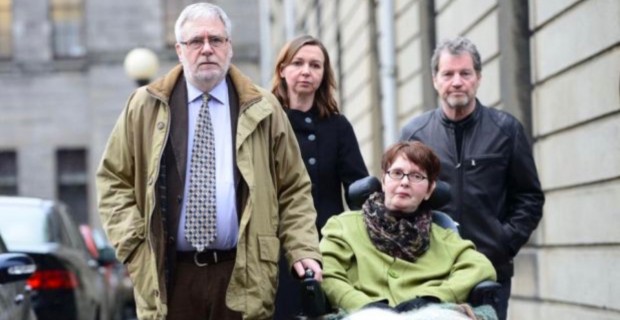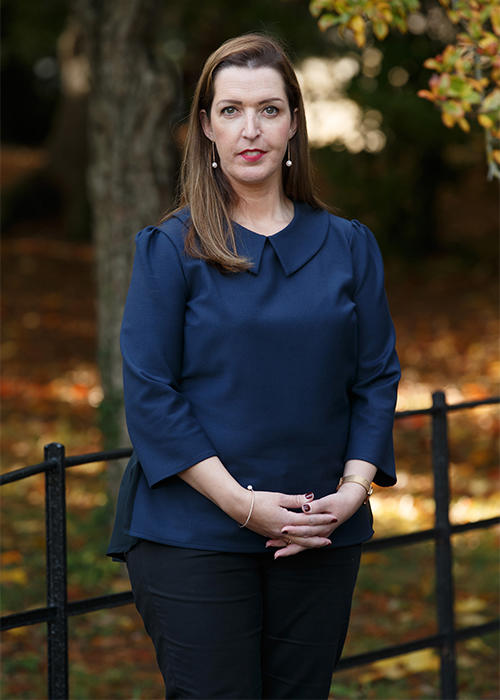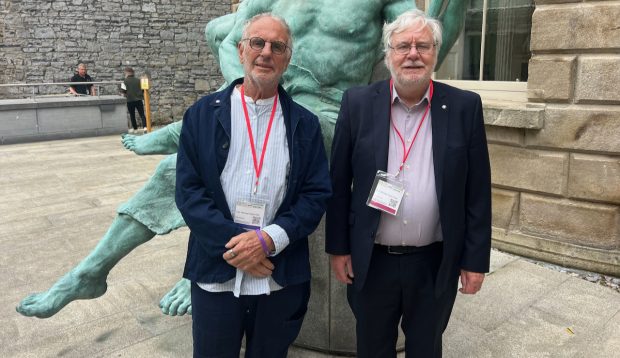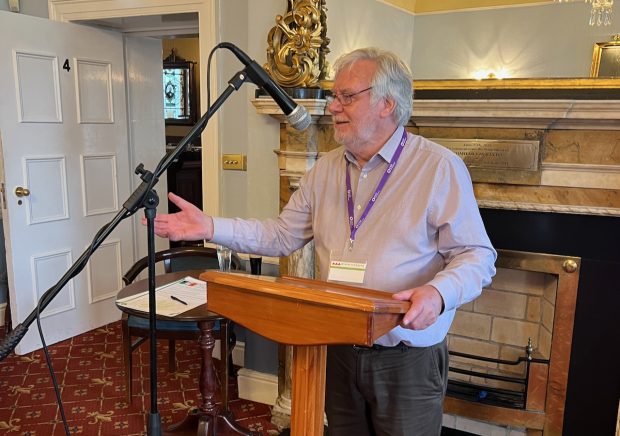March 10, 2024
Explainer: A ‘breakthrough moment’ for assisted dying in Ireland
Right-to-die campaigners hailed a historic ‘breakthrough’ on Thursday after politicians backed legislating for assisted dying.
The cross-party Oireachtas Committee on Assisted Dying recommended, by a large majority, that Ireland should allow euthanasia and assisted suicide for those with terminal and neurological conditions who have months to live.
Advocate Tom Curran, whose wife Marie Fleming took a landmark case against the State before her death in 2013, said the development was ‘a move in the right direction’.

Tom & Marie outside court in 2013
Meanwhile, Dignity In Dying’s John Wall praised his late friend Vicky Phelan’s role in the battle to reform the law.
However, the legislation will not be delivered in the lifetime of the current Government, senior Cabinet sources have told the Irish Daily Mail.
With the Coalition’s term due to finish in March next year, one source said the Dáil schedule is ‘far too tight’ to produce and pass what will be complex legislation before then.

Vicki Phelan
That means it will likely fall to the next government to legislate on the controversial and emotive issue after the next election. The Cabinet will first have to consider whether to approve the proposals from the committee, which has been conducting public hearings for the last nine months.
The committee has recommended that people with a terminal prognosis, with less than six months to live, should be able to avail of an assisted death.
For those with neuro-degenerative conditions, such as motor neurone disease, they will be able to avail of an assisted death if they have up to 12 months to live.
A doctor must say the person is more than likely, at least 51%, to die in these timeframes to qualify. It’s understood this was a ‘contentious’ point in the committee’s debates as some members were concerned it was ‘vague’. However, it was passed by a majority of the members.
Euthanasia is also recommended, in which a doctor would take the action to end life when the person wanting to die is incapable of physically administering the necessary medical substance themselves.
The committee report will also include a conscience clause allowing any doctor, nurse or medical worker not to be involved.
The 14-member committee voted nine to three in favour of the proposals, with one abstention and another member not present for the final vote.
It’s understood Independent TD and committee chair Michael Healy-Rae, Senator Rónán Mullen and Fianna Fáil TD Robert Troy voted against the recommendations, with Sinn Féin TD Pa Daly abstaining.
Campaigners hailed the role of advocates such as Ms Phelan and Ms Fleming as being ‘crucial’ in the latest development.
Dignity In Dying’s Mr Wall said this would be CervicalCheck campaigner Ms Phelan’s ‘legacy’ but also praised other advocates such as Ms Fleming.
He said: ‘It’s because of Marie and Vicky that we need to keep this conversation alive, and we need to keep it moving in the right direction.’
Ms Fleming was one of the country’s leading campaigners on the issue, losing a Supreme Court battle in 2013 in a bid to travel to Switzerland to end her life as she chronically suffered from multiple sclerosis.
Her widower Mr Curran hailed the committee’s recommendations as a ‘breakthrough moment’. The director with end-of-life organisation Exit International, also said it was a ‘move in the right direction’.
However, he said his measure of any proposed legislation is ‘would Marie qualify for this, and the answer is no’.
He said that doctors working with those with neurological conditions ‘are not quite prepared to give a time scale’ of how long their patient has left to live, with Ms Fleming’s doctor saying it was ‘impossible’ to give her a prognosis.

Philip Nitschke & Tom Curran, Oireachtas, October 2023
Mr Curran said he is concerned that there could be legal challenges from those who feel they should qualify.
‘Why not get it right the first time instead of having to change it after a decision in the courts?’ he asked On the other side of the debate, there is significant resistance to the proposals, particularly in the medical sector.
Hope Ireland, a coalition of medical professionals and disability rights advocates, said it finds the recommendations ‘troubling’.
‘We are concerned about the international evidence showing that countries which introduce euthanasia on supposedly “very restrictive grounds”, that the eligibility is expanded based on equity.
We saw that happen in Canada,’ said Dr Miriam Colleran, coalition member and consultant in palliative medicine. ‘The evidence shows that people seek assisted dying in particular because of feelings of burden …
The risk with assisted dying is the inappropriate death of a person. That’s an enormous risk.
The group said it is concerned about people being ‘coerced’ into choosing assisted dying.
Once the Oireachtas committee’s report is published on March 20, it will be given to the Government, where it understood it will be ‘carefully considered.’
The recommendations only allow for those who are Irish citizens or permanent residents to avail of assisted dying here.
In 2021, it was recommended that an Oireachtas special committee be established to undertake an examination on the topic of assisted dying.

Tom Curran at Exit’s workshop, October 2023
This came after the Justice Committee examined the Dying With Dignity Bill, which was put forward by People Before Profit TD Gino Kenny.
Mr Kenny told the Mail on Thursday: ‘It’s important that whoever is in power, whether its this Government or the next one, that they legislate for assisted dying.
The committee has recommended legislative change, and there is huge public support for this issue and these recommendations copper-fasten it.’